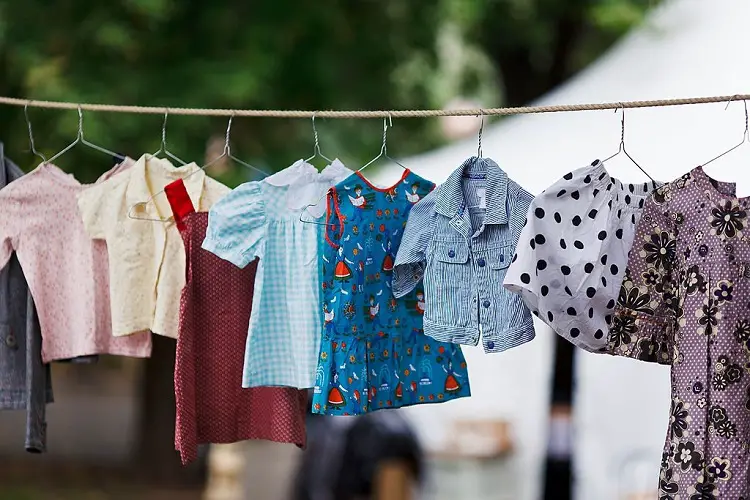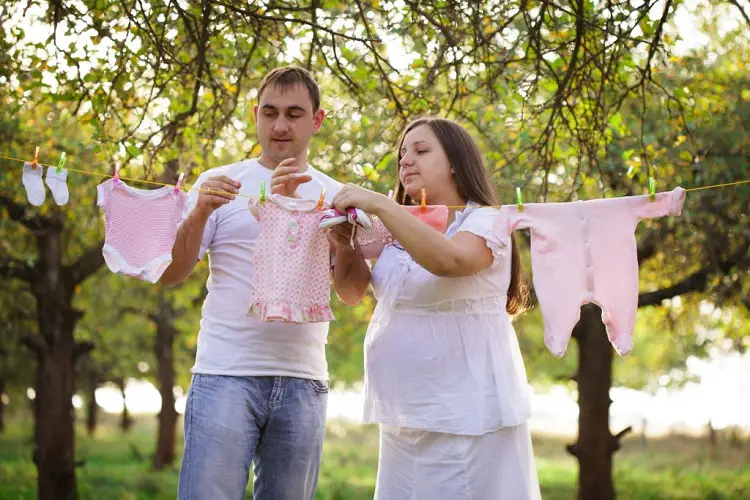Laundry time for many adults, especially the guys, is just a haphazard cycle of tossing a crumpled heap of clothes in the washer, setting it to whatever heat, washing, drying, and then boom, the clothes are ready for use.
But when it comes to babies, as a parent, you need to adopt a more gentle care routine for your baby’s clothes which brings us to the question of how to wash baby clothes without shrinking them.
Read on as we answer your question and other baby-washing-related questions that might come to mind.
Baby Clothes: What You Should Know
When considering the type of baby clothes that will not shrink or stretch easily, check out the instructions label for any indication of the fabrics the clothes are made of.
Baby clothes are usually made of a blend of soft fibers which are much more delicate than our clothes as adults. These fibers react differently when continuously washed and exposed to heat.
There are baby clothes with loose ends which are usually made of cotton and wool-they tend to stretch more with continual washing and drying than those made of polyester or nylon, which in many cases shrinks if not handled well.
How To Wash Baby Clothes Without Shrinking Them
When shopping for our baby clothes, we select the cutest clothes for our little ones.
To avoid ruining these beautiful clothes, laundry time should be paid more attention than we pay to our clothes.
Baby clothes are like those delicate items we handle with extra care. Doing laundry as a parent, you have to be particular about the type of detergent you use on the clothes that will not react to your baby’s delicate skin.
Although many detergents are said to be gentle for baby items, some have a very harsh feel to our hands and a strong fragrance to the nose.
Using this type will be too strong for the clothes and may cause your baby to sneeze due to their strong fragrance.
Fortunately, baby detergents with very mild reactions and fragrances will not damage the clothes or cause your baby to sneeze.
When washing baby clothes, use a cold water cycle to wash and dry them on low heat, after which you will fold them immediately to prevent them from shrinking.
Although handwashing baby clothes means giving them more needed attention, it is time and labor-intensive, so while not using a washer. Here are the steps on how to wash baby clothes without shrinking them.
Step 1: Sort out the colors
Mild detergents are usually non-color bleeding, but in order not to take any chances, separate the colors into their various shades to prevent damaging other colors should, in case, one fabric color bleeds during the washing process.
Step 2: Add your baby detergent
Pour ½ cup of the detergent into the washer. If you’re working on a budget and cannot afford to buy a separate detergent from one of the general households, you can choose a less harsh detergent for the entire household. That way, it can also be used for your baby’s clothes.
Step 3: Use cold water
Run some cold water into the washer and set it to wash with a gentle spin.
Step 4: Dry on low heat
For knit or woven clothes like wool sweaters that can easily trap other fibers in or squeeze and lose their beauty, spread flat on the dryer while drying and on low heat to prevent them from losing shape or trapping in other fibers.
Step 5: Fold
When you’re done with washing and drying, leaving them in the dryer can cause them to become wrinkled. Fold them out of the dryer and stow them away in the baby drawers or bags.
Read: How To Fold Baby Clothes
How To Get Stains Out Of Baby Clothes

Seeing stains on your baby’s clothes is a normal sight for many parents if not all. These stains can result from poop, pee, or playing around the house.
Failure to get them out and you’d be going to the store to change the entire wardrobe of your little one. Here are the tips on how to get rid of these stains when they occur.
Always remember to pretreat the stains before putting the clothes into the washer, you can’t be too sure that all the stains will come off in the washer, and when it dries up with the stain not gone, you’re very much stuck with it.
Spray the stain with your favorite stain remover and spot wash with your hands under warm water before dumping it with the other clothes into the washer.
This will eliminate a greater part of the stain on the clothes; the washer will do the remaining stains.
Pro Tip:
When washing your baby’s clothes, consider the type of washer you use.
Front-loading washers or HE top-loading washers are usually gentler on clothes than those with a center agitator.
Other FAQ’s
What Is The Best Temperature For Washing Baby Clothes?
The temperature setting of your washer also affects your baby’s clothes. Using hot water to wash them will expose them to a harsher temperature that makes them more susceptible to damage than when you use cold water.
Use a cold water cycle or a delicate setting when washing baby clothes. Cold water is less harsh on baby clothes than hot water; it prevents shrinkage and washes well.
Can You Unshrink Baby Clothes?
The answer is yes! To do this, soak the material in a solution of lukewarm water and a capful of baby shampoo. Then gently knead the material with your hands to help relax the fibers.
Then roll it dry or pat it gently with a towel, and then use your hands to stretch the material out to its original size gently. Then finally, air dry.
Should Baby Clothes Be Washed Immediately After Purchase?
It is a matter of preference, but you stand to lose nothing if you do. Many people opt to wash their baby’s clothes before any use because of the likeliness of the presence of germs either from the manufacturing end, shipping, or even on the shelf at the store.
How Often Should I Wash My Baby’s Clothes?
Normally, once your baby has worn something, washing them before wearing them again is hygienic. It’s that simple!
Stains from blowouts, diaper leaks, spit-ups, milk spills, and drool can carry a lot of germs, and you don’t want to reuse anything with these kinds of stains since they pose a serious health hazard to your baby.
Can I Use Fabric Softener Or Dryer Sheets For My Baby Clothes?
You shouldn’t when in doubt. Fabric softeners and dryer sheets are usually formulated with perfumes, chemicals, fragrances, and other additives which can irritate your baby’s sensitive skin.
And aside from these reasons, you don’t need them. Most parents use them only to add a nice, fresh smell to their laundry loads. In the case of dryer sheets, it helps reduce static electricity.
Can Baby Clothes Shrink In The Dryer?
Drying your baby’s clothes is also important in preventing them from shrinking. Just like how you set your wash cycle, the setting you put your dryer on also greatly affects the fibers of your baby’s clothing.
So our answer is yes, there’s every chance your baby’s clothes can shrink in the dryer, especially if you set the heat on high.
It becomes too harsh for the clothes. We recommend you tumble dry baby the clothes for best results.
Should Baby Clothes Be Washed Inside Out?
It is not a must for baby clothes to be washed inside out, but it is advisable to do so with clothes with buttons, zippers, or any extra accessories that may scratch or even rip other clothes.
Do Carter’s Clothes Shrink?
Some reviewers online stated that they had issues with Carter’s clothing shrinking. Other parents state that they had no problem at all.
It all depends on how you care for your baby’s clothes. Of course, Carter’s did not have any specific instructions on their website about caring for their clothing because each garment is different.
Therefore, it is best advised to always refer to the care instructions on each clothing tag for the best recommendation for care.
For the best results, always wash on delicate, low-heat settings for baby clothes from Carter’s.
Do Children’s Place Clothes Shrink?
Like Carter’s clothing, some online reviewers have mixed comments. Some claim that Children’s Place manufacturers can prewash and preshrink clothing to avoid shrinking when the consumers get them.
Although, this depends on the item, and in my experience, pre-washing doesn’t always guarantee that baby clothing won’t shrink. It’s best advised to follow the care label instructions on each item accordingly.
Do Old Navy Baby Clothes Shrink?
Most reviewers online reported that they did not have any problem with Old Navy baby clothes shrinking. But, yet, this all depends on the particular item of clothing.
If you notice your baby’s clothes are shrinking after a wash or two, you may be able to save them. Most parents turn to a good ol’ stretch before dressing their baby.
Putting your fist in your baby clothes while stretching the fibers can do a great job in bringing your clothes back to normal size and becoming wearable again.
Do Baby Gap Clothes Shrink?
Many reviewers online include threads of parents discussing the chances of baby clothes from The Gap shrinking.
When shopping at Baby Gap, compare the sizing to other brands to check if they run small or large. You can prepare for shrinking by buying a larger size than you normally would have for your baby.
Alternatively, you can try handwashing or air-drying methods to prevent your Baby Gap clothing from shrinking.
Related Posts:
- Can I Use Tide on Baby Clothes?
- Best Stain Remover For Baby Poop
- How To Whiten Baby Clothes Naturally Without Bleach
- How To Remove Old Baby Stains Formula From Clothes
- How To Use Oxiclean To Remove Tough Stains On Baby’s Clothes?
Conclusion
Doing laundry yourself can be a pretty simple task, sorting out colors, washing, and drying. But when it has to do with the clothes of your little one, you have to be careful not to ruin them since they are more delicate than yours.
You have to have basic knowledge on how to wash baby clothes without shrinking them to avoid changing your baby’s wardrobe every two weeks. And as cumbersome as it sounds, it is quite easy to follow up with after a few times of trials.
The different fabrics used in making different baby wears all react differently when constantly exposed to frequent washing and drying, check the instructions label on each cloth to know the required temperature and the washing process in general.
